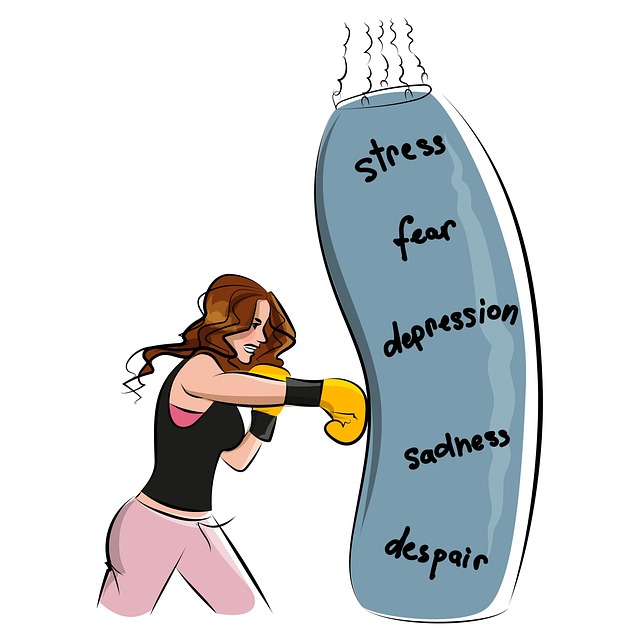Lone Tree Codependency Therapy offers personalized workshops to combat modern stress, focusing on mental wellness and relationship dynamics. These interactive sessions blend theory with practical tools, covering topics like time management, communication strategies, mindfulness, and cultural competency for healthcare providers. By fostering community, encouraging reflection, and providing ongoing support through follow-up programs, these workshops aim to empower participants to manage stress effectively, improve work-life balance, and contribute to organizational mental health policy development, ultimately enhancing overall well-being.
Stress management workshops are an essential tool for organizations aiming to foster healthy, productive environments. This comprehensive guide explores effective strategies for designing and facilitating such workshops. From understanding stress and its impact on individuals and teams, to engaging facilitation techniques and measuring success, we delve into a structured approach. Learn how Lone Tree Codependency Therapy can empower employees, enhance well-being, and drive positive change within your organization.
- Understanding Stress and Its Impact on Individuals and Teams
- The Role of Workshops in Stress Management: A Comprehensive Approach
- Designing Effective Stress Management Workshops: Content and Structure
- Facilitation Techniques for Engaging and Empowering Participants
- Measuring Success and Sustaining Change: Post-Workshop Follow-Up Strategies
Understanding Stress and Its Impact on Individuals and Teams

Stress is an inevitable part of modern life, but its impact on individuals and teams can be profound if left unaddressed. Understanding stress goes beyond merely recognizing its presence; it involves comprehending how it manifests differently in each person. What may be a significant stressor for one individual could be barely noticeable to another. This variability underscores the importance of tailoring stress management strategies to meet unique needs, as one-size-fits-all approaches often fall short.
At our workshops, we emphasize the interconnectedness of mental wellness and inner strength development. By promoting self-care practices that cater to individual needs, we aim to help participants cultivate resilience in the face of life’s challenges. Lone Tree Codependency Therapy serves as a framework for navigating complex interpersonal dynamics and fostering healthier relationships, all of which contribute to enhancing overall well-being and reducing stress levels within teams.
The Role of Workshops in Stress Management: A Comprehensive Approach

Workshops play a pivotal role in stress management, offering a comprehensive approach to addressing and mitigating work-related stress. These structured sessions provide individuals with tools and techniques to enhance their mental wellness and resilience. By facilitating open discussions, interactive activities, and personalized strategies, workshops help participants gain insights into their stress triggers and develop effective coping mechanisms. This proactive approach not only benefits employees’ immediate well-being but also has long-lasting positive effects on their overall mental health.
In the context of Lone Tree Codependency Therapy, workshops can be tailored to meet specific needs, focusing on topics such as time management, stress reduction techniques, and building healthy boundaries. These sessions cater to a diverse range of professionals, enabling them to navigate work’s demands while maintaining a healthy work-life balance. Moreover, by incorporating elements of Mental Wellness, Risk Assessment for Mental Health Professionals, and Mental Health Policy Analysis and Advocacy, workshops contribute to creating a supportive environment that prioritizes not just individual well-being but also organizational health and policy development in the mental health sector.
Designing Effective Stress Management Workshops: Content and Structure

Effective stress management workshops require a thoughtful approach to content and structure, especially when addressing complex issues like codependency. At Lone Tree Codependency Therapy, we understand that workshops should be tailored to meet the specific needs of participants. This means incorporating both theoretical knowledge and practical tools for managing stress, anxiety, and their underlying emotional triggers. Engaging activities, interactive exercises, and group discussions can help individuals develop healthier coping mechanisms and improve their overall mental wellness.
The workshop structure should balance educational content with opportunities for personal reflection and skill application. Topics like communication strategies, mindfulness techniques, and setting boundaries are essential components. By integrating these elements seamlessly, participants can gain valuable insights and practical take-aways that they can implement in their daily lives. Additionally, cultural competency training for healthcare providers can be woven into the fabric of the workshop, ensuring inclusive and effective support for a diverse range of attendees.
Facilitation Techniques for Engaging and Empowering Participants

In Lone Tree Codependency Therapy workshops, facilitating engaging and empowering sessions is key to helping participants manage stress effectively. Interactive activities, such as group discussions and role-playing exercises, break down complex topics into digestible parts and encourage active participation. These techniques not only make the learning experience more enjoyable but also deepen understanding and foster a sense of community among attendees. By creating a safe, supportive environment, facilitators can help participants explore their stress triggers, develop personalized coping strategies, and cultivate resilience.
Incorporating practices like Compassion Cultivation and Burnout Prevention into the workshops further enhances participant empowerment. Healthcare Provider Cultural Competency Training can also be woven into these sessions to address the unique challenges faced by professionals in high-pressure environments. Through a blend of theoretical knowledge and practical exercises, participants gain valuable tools to navigate stress, improve well-being, and enhance their ability to support others effectively.
Measuring Success and Sustaining Change: Post-Workshop Follow-Up Strategies

Measuring success and sustaining change are vital components of any stress management workshop. Immediately following the event, organizing a series of check-ins or follow-up sessions can help participants solidify their newfound skills and knowledge. These meetings allow facilitators to assess the impact of the workshop, identify areas for improvement, and provide additional support as needed. For instance, Lone Tree Codependency Therapy could implement a post-workshop survey to gauge participant satisfaction and the practical application of learned techniques in their daily lives.
Additionally, integrating ongoing Mental Health Education Programs Design can further foster positive outcomes. Regular follow-up sessions, either one-on-one or in small groups, offer spaces for open dialogue about challenges faced since the workshop and successful coping strategies. These discussions not only reinforce mental health practices but also contribute to Depression Prevention and Mental Illness Stigma Reduction Efforts by creating supportive communities where individuals feel empowered to share their experiences and learn from one another.
Stress management workshops are powerful tools for organizations to invest in their employees’ well-being. By understanding the impact of stress on both individuals and teams, as outlined by Lone Tree Codependency Therapy, companies can design comprehensive workshop programs that empower staff with practical techniques. Through engaging facilitation methods and structured content, these workshops become transformative experiences, fostering resilience and positive change. Post-workshop follow-up strategies ensure sustained improvements, creating a healthier and more productive work environment.














